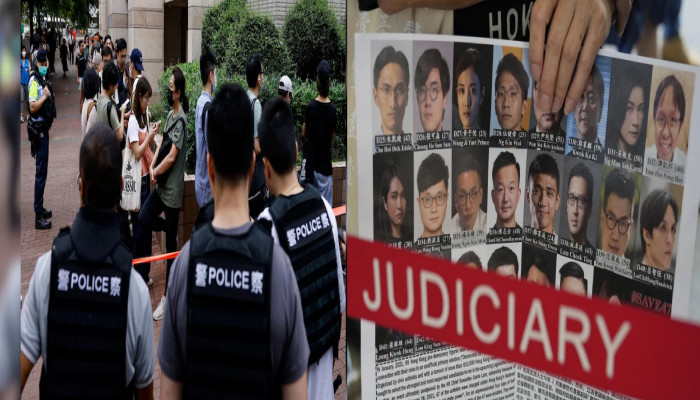Hong Kong to sentence 45 democracy activists in largest security law trial
- In Reports
- 02:01 PM, Nov 19, 2024
- Myind Staff
In the largest national security trial in the city, a Hong Kong court will jail dozens of former democracy supporters. This decision is expected to further discourage dissent in the financial centre and draw criticism from the Western governments.
The sentencing of former youth activist Joshua Wong, 28, and legal scholar Benny Tai, 60, is set to begin at 10 a.m. on Tuesday, nearly four years after their arrest during a large-scale police operation that targeted numerous opposition figures. The United States has referred to the case as "politically motivated" and promised to restrict visas for those in charge of implementing Beijing's crackdown on national security.
Wong and Tai were among 47 activists charged with subversion under a China-imposed national security law for organising unofficial primary elections in 2020. Over 600,000 voters participated in the polls to select candidates for Hong Kong’s Legislative Council elections. Authorities in Hong Kong alleged that the event was part of an unlawful plan to disrupt the government, while Beijing accused the activists of attempting a “colour revolution.” The mass arrests in 2021 effectively dismantled Hong Kong’s political opposition, with most of the accused denied bail.
This landmark case, alongside the ongoing trial of Jimmy Lai resuming Wednesday, coincides with Hong Kong hosting a global summit of financial leaders to reinforce its reputation as an international financial centre. The sentencing could further strain the city’s geopolitical relationships. Meanwhile, the United States is weeks away from the possible return of Donald Trump to the presidency, whose first term imposed sanctions on Chinese officials over aggressive Hong Kong policies. Earlier this year, State Department spokesman Matthew Miller stated that the US administration issued a warning in May that heavy penalties would only "further erode confidence in Hong Kong’s judicial system."
“These national security cases have already made their mark and will no doubt further do so when expected harsh sentences are reached,” said Michael Davis, a global fellow at Washington's Woodrow Wilson International Centre for Scholars. “Hong Kong’s big attraction was always its reliable rule of law and openness,” he added. “With such diminished rule of law, some companies move their offices and others cut back.”
Wong’s sentencing will bring a close to a remarkable political journey that saw him become a global symbol of Hong Kong’s democracy movement. His activism began at the age of 15, when, as a bespectacled high school student, he played a key role in halting a proposal to introduce mandatory patriotic education in Hong Kong schools. Two years later, he gained international recognition alongside Tai by leading a sit-in that thrust the city’s pro-democracy struggle into the global spotlight. Thousands of protesters occupied major thoroughfares in the city’s business district, using umbrellas as protection against police pepper spray — a defining moment that gave rise to the name Umbrella Movement.
While Wong has a larger international profile, Tai is accused of masterminding the unsanctioned primaries and faces a potential life sentence for organising the polls. Wong, deemed a participant, could face up to 10 years in prison. The least severe offenders are expected to receive no more than three years, following a three-tiered sentencing framework. A new national security law passed in March has undermined the hopes of some activists who anticipated being freed after serving more than three years before sentencing. The law, known as Article 23, makes it more difficult for those convicted of national security offences to receive a one-third sentence reduction for good behaviour, a change currently being challenged in the High Court.
These cases arise amidst growing concerns about the future of the rule of law in Hong Kong, following an unprecedented departure of foreign judges from the Court of Final Appeal — a key feature once highlighted by local officials as an attraction for foreign businesses. In June, Lord Jonathan Sumption of the United Kingdom resigned from Hong Kong's highest court, citing "grave danger" to the cherished legal system. Sumption's criticism was refuted by Hong Kong, which claimed that Beijing and local authorities were exerting any political pressure on its courts.
On Tuesday, 31 of the accused pleaded guilty, while 14 others were convicted after rejecting the charges. Two individuals were acquitted in May, marking the end of a conviction streak under the law since it was imposed by Beijing in 2020. The fate of other individuals, including former lawmakers Claudia Mo and Leung Kwok-hung, known as Long Hair, and journalist-turned-activist Gwyneth Ho, is still to be determined.







Comments